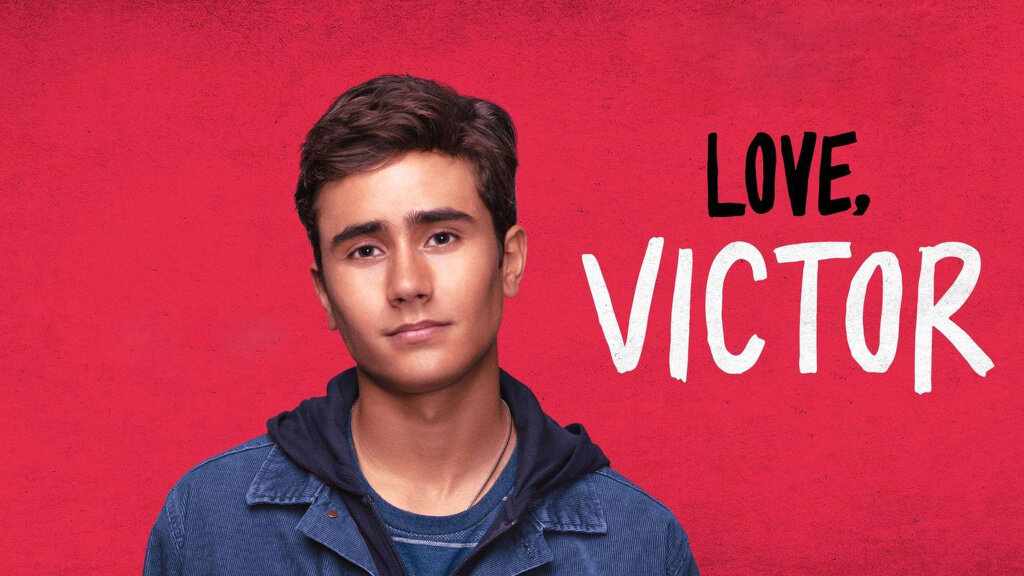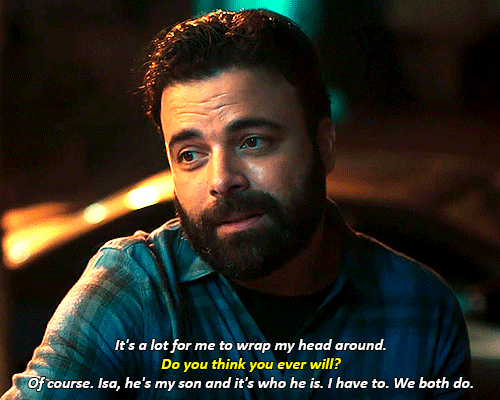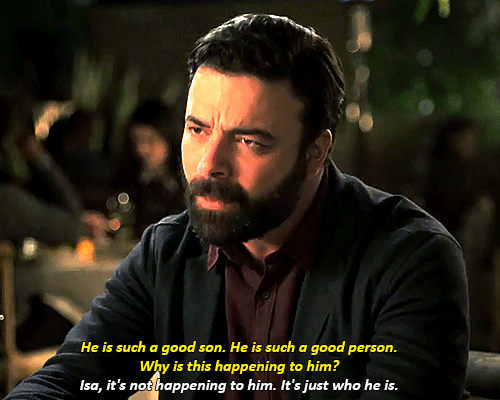“Love, Victor's” Armando Salazar: Queer TV's Father of the Year
Five years after the Pulse Orlando shooting, two shows featuring LGBT Latino leads—Love, Victor and Owl House (2020-)—premiered their second seasons. In addition, Charmed showcased the struggles of a pregnant Puerto Rican lesbian and Stephanie Beatriz’s Carla in In The Heights (2021) shared subtle displays of affections with her girlfriend. In the context of diverse storylines and age representation, it feels pertinent to also call attention to Love, Victor’s secondary storyline of Victor’s parents, Isabel and Armando Salazar. Depicted by Puerto Rican actress Ana Ortiz and Colombian actor James Martinez, these characters revisit and reimagine parental responses to their queer teens that other shows in which they performed explored: Ugly Betty (2006-2010) and One Day at a Time (2017-2020), respectively.
As a Queer Rican who followed the headlines in the day after the tragedy, Armando Salazar’s fatherhood contrasts the story of a father who refused to claim his son after the Pulse tragedy. While the hospital was able to find extended family to claim the dancer, Love, Victor’s Armando works to show he loves his son unconditionally. Within the context of the significant role of parental support in coming out and the responses of other Latinx straight characters to their queer children on other television shows, Armando Salazar’s flawed, fearful, yet supportive response and emotional struggle disrupts machismo and the racialized homophobia often depicted across a racially diverse ensemble cast featuring queer Latinos.
The showrunners intentionally develop James Martinez’s Armando as being more supportive in contrast to Ana Ortiz’s Isabel Salazar. Their short- and long-term reactions to their son’s truth becomes a point of conflict for them, something we rarely got to see with the parents of Brooklyn 99’s Rosa Diaz or the parents of Grey’s Anatomy’s Callie Torres. The fleshed out storylines of contrasting responses by Latino TV parents to their gay sons disrupts stereotypical depictions of (Latino) masculinity in light of the vulnerable risks Victor Salazar, a Latino gay male, take in coming out and his father. Armando Salazar’s choices prioritize building an emotional vocabulary of support and solidarity.
In the first minutes of the episode “Perfect Summer Bubble,” viewers see Armando ask Victor, “When did you decide this?” To which Victor responds, “I am this.” Isabel then cuts off the conversation so that everyone can get some sleep. Victor’s narration speeds the viewer up until the end of the summer, which has Armando stumbling through cheesy nicknames for Victor’s new boyfriend, Benji. At the end of the first episode, he tells Isabel that while “it’s a lot for [him] to wrap his head around,” he has to because Victor is his son and he loves him. Within the first two minutes of the episode, Armando prioritizes loving his son over the initial confusion his son’s declaration had sparked. In doing so, the episode showcases that when asked about what takes priority when a young person lives their truth, it’s important to respond with unconditional love.
During an OutFest panel, Martinez explains that he observed how his own relatives were “miss[ing] out on getting to know [his] LGBTQ relatives,” with a candid frustration and disappointment regarding what his family loses in not supporting their queer relatives. Martinez’s empathy translates well into his character, much like Penelope Alvarez (Justina Machado) in Netflix and Pop Sugar’s One Day at a Time. While Machado’s Penelope stumbles in the course of one episode, Martinez’s Victor Alvarez takes two full seasons to apologize for not participating in Elena’s quince because she decided to wear a suit. From episodes like “Pride and Prejudice” to “Ghosts,” Victor Alvarez transitions from a father disappointed in his daughter’s truth to a repetent father speaking out against his failure. The writers construct Martinez’s Salazar, unlike Alvarez, as the parent who immediately attempts to seek out tools to better support their son. On watching the show, we see him exercising vulnerability with other P-FLAG attendees while stating that support for his son stands as a priority in all the relationships—social and otherwise—he develops with other characters.
In “Gay Gay,” the episode alternates between Isabel, concerned with his husband’s lack of vulnerability, seeking counsel from her Catholic priest, and Armando seeking counsel regarding how to express support for his son during this difficult time. In other words, Armando becomes more vulnerable and expressive as a result of his son’s coming out, despite what Isabel explains to her priest. Their distinct struggles with how to express support for their gay son adds tension to their relationship and in “Table for Four,” becomes a contentious point regarding the potential for their reconciliation. Armando needs a partner who supports the way he’s aiming to support his son.
In light of the handful of television shows that briefly visit father/child dynamics—whether minors like One Day at a Time’s Elena or adults like Grey’s Anatomy’s Callie Torres—Armando Salazar humanizes the stumbling of the parent who prioritizes loving their child over social expectations. If fan fiction, tumblr, and social media posts regarding gay teen representation have anything to say about it, Armando Salazar is the kind of father/parent gay teens dream of. Skimming through some of the first attempts of Love, Victor fan fiction last summer, it was great to see showrunners and writers approach Latino parental responses more critically and compassionately than some early fanfics predicted.
Returning to Outfest’s panel, executive producer Marcos Luevanos and showrunner Brian Tanen spoke to their intent at being graceful with parents because they wanted to give time to that. This show, despite the robust teen dramedy storylines, arguably centers on providing palatable and entertaining content to a heterosexual audience. In providing entertaining content that queer teens can share with their straight families of origin, they “flip the stigma of the Latin man” (Outfest panel). Writers and producers take great care in broaching the difficult subject of a teenage cisman of color’s life after he begins living as a gay man in a relationship with a white gay peer.
Within the world built across two seasons, Armando Salazar showcases sensitivity, an aim to please, and a struggle to define who he is amid the expectations of his partner, children, and parents. Fan fiction writers may have presumed his homo-antagonism because of how in season one episode “Sweet Sixteen,” he struggled with his own father’s response to Victor’s baby brother Adrian playing with girl’s toys and Benji kissing his then boyfriend at Victor’s birthday party. In the second season, Armando demonstrates amazing growth and introspection in light of the shifting needs of his children.
In the historic evolution of Latinx LGBT characters’ biological family story arcs and narratives, Armando Salazar’s story, like One Day at a Time’s Penelope, disrupts the racialized homophobia of earlier representations implicitly showcased in the evolution of Ricky Santiago on My So-Called Life (ABC 1994-95), and Carlos Torres on Grey’s Anatomy. (ABC, 2006-2014)
Love, Victor, for its classic teen dramedy angst, depicts a gay working-class Latino male’s struggle in choosing to be out and who his gayness and/our coming out process needs to please. At a time when there are families unlearning setting cisgender and heterosexual expectations for their children, Victor’s coming out process and struggle to sustain his identity and positioning within his communities remind viewers that LGBTQIA community members still need to explain to a dominant cisgender, straight society. In light of how this twenty-two minute per ten episode challenges the viewer on who your sexual identity and gender expression need to serve, it is uplifting to see a father work hard on challenging his own straight privilege to be the best parent for his son. Given how little we’ve seen written for LGBT Latinx characters Latinos and non-Latinos over the years, I hope Martinez finds greater support for his work and his investment in giving us a father who unconditionally celebrates his child and supports his child through the struggles the world will give him for living his truth. Because the queer community still struggles with parents’ commitment to support their sexual identity and gender expression choices, I hope the show gives families the opportunities to have vulnerable conversations about the work straight, cis-het family needs to do for us. As the government and the church resist full and unconditional support, our families’ and communities’ support become more critical than ever.
Erika G. Abad has been a teaching-centered professor for University of Nevada Las Vegas’s Interdisciplinary, Gender, and Ethnic Studies Department since the fall of 2016. Since then, her students have introduced her to the worlds of fandom via lesbian and bisexual fan conventions, which then led her into fandom studies. Aside from presenting and moderating panels at fan conventions, she's written for and been interviewed by Vegas local presses regarding LGBT characters. She’s been featured on Latinos Who Lunch to discuss Latinx queer representation on television. She's also written a few pieces on queer Latinas for Latinx Spaces. You can follow her on Twitter and Instagram @prof_eabad.



